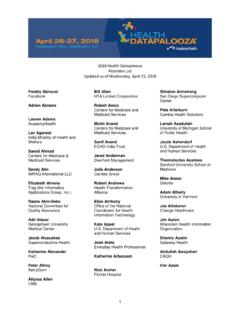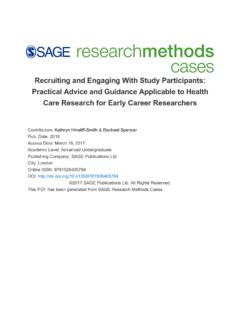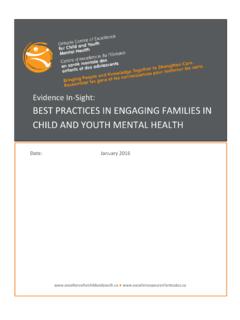Transcription of Engaging Health: Health Research and Policymaking in the ...
1 Engaging Health : Health Research and Policymaking in the Social Media Sphere By Brian G. Smith, and Staci B. Smith Purdue UniversityAcademyHealth is a leading national organization serving the fields of Health services and policy Research and the professionals who produce and use this important work. Together with our members, we offer programs and services that support the development and use of rigorous, relevant, and timely evidence to increase the quality, accessibility, and value of Health care, to reduce disparities, and to improve Health . Launched in 2013, AcademyHealth s Translation and Dissemination Institute helps move Health services Research into policy and practice more effectively. It undertakes activities that help Research producers better understand the needs of Research users, and serves as an incubator for new and innovative approaches to moving knowledge into action. This project is supported by the Robert Wood Johnson Foundation, Kaiser Permanente, and 20152 Engaging Health : Health Research and Policymaking in the Social Media SphereApril 2015 Executive SummaryIntroductionDigital media such as social networking sites and smart phone apps have led to unparalleled opportunity for public involvement in Health issues and Health -related organizations.
2 Central to this phenomenon is the concept of engagement, which represents individuals inter-activity with online messages and content through activities such as friending, sharing, following, and commenting. While information on Health information seeking is well established, insights into en-gagement with Health policy and Research online are nearly nonexis-tent. The purpose of this paper is to fill the gap in understanding by applying the tenets of social media engagement to Health policy and Research online in order to answer the following question: How can Health communicators and policymakers engender online engage-ment with Health policy and Research online? This paper is one of eight papers commissioned by AcademyHealth to explore best prac-tices from outside Health care for the translation and dissemination of Health services FindingsWhile many Americans turn to the Internet for Health informa-tion, vulnerable populations are less likely than other publics to seek Health information online.
3 For more than half of adults, the Internet is a primary channel for seeking Health This active Health -seeking behavior is a targeted activity focused on gathering specific information on healthy lifestyles, Health symptoms, and treatment options. However, some groups continue to face significant challenges in accessing Health information, including people of lower socioeconomic status, racial and ethnic minorities, and senior Low levels of Health engagement online among vulnerable publics lead to low levels of Health literacy, which in turn correlate with Health outcomes and Even though significant Research has focused on these and other trends related to information seeking on Health and lifestyle behaviors, little Research has considered the ways that Health publics seek out and process Health Research and policy information, much less the extent to which they do so online. Social media engagement is a powerful tool for fostering discussion, learning, and collaboration among individuals and communities.
4 Social media engagement is a seemingly continuous activity of infor-mation seeking, processing, and distributing based on an individual s interactivity with online content. Social media engagement is similar to civic, organizational, and stakeholder engagement in that it repre-sents individuals motivated and affective commitment to interacting and fulfilling roles within their communities. The difference is that social media engagement involves attachment to online content as well as contributions to online communities in which the message communicated by an individual plays a central role in motivating behavior. As a content-based phenomenon, social media engagement comprises four salient characteristics: Absorption in the experience, which is contingent on the extent to which online content and the online experience fulfills personal needs and wants Self-expression and representation, which stems from individuals development of a public image used in their online communication Empowerment, which is derived from a social media user s ability to navigate online networks as well as from confidence that his or her communicated message will make a difference Interactivity, which takes the form of meaningful and intimate conversations with fellow usersEfforts to engage vulnerable populations and other publics on-line in Health Research and policy should include messaging that is conversational, collaborative, socialized, and media engagement offers the potential to improve societal and global Health by involving individuals in the Health policy and Research process.
5 To realize this potential, online efforts to engage the public in Health policy and Research should include messaging with the following characteristics: Conversational messaging uses a conversational human voice and language that is accessible to lay audiences. In Health messaging, the conversational human voice replaces inaccessible policy and Research speak with efforts to be open to dialogue, responsive, transparent, and even ,5 For publics that may not seek Health information online, conversational messaging involves the attachment of Health messaging to broader social issues of interest to the general public. Conversational messaging may also be effec-tive when developed around specific Health contexts reflecting the concerns of the target audience. Collaborative messaging helps promote trusting relationships among Health consumers, researchers, policymakers, and others, paving the way for informed, consensus-driven decision-making.
6 Collaborative messaging through social media involves the com-munication of credible and transparent content with the dual goal of informing publics and encouraging their participation in policy development. Central to collaborative messaging is an openness to learning and self-reflection and a willingness to engage in back and forth dialogue with other Socialized messaging reflects the community nature of the social media sphere and the assumption that messages transmitted from a trusted source such as a friend or family member are more valued than messages conveyed by nonpersonal sources. As such, the success-ful engagement of the public in Health policy and Research requires 3 Engaging Health : Health Research and Policymaking in the Social Media SphereApril 2015the translation of Research and data into social content that reflects a community s interests and reaches influential communicators.
7 Among groups characterized by low socioeconomic status, Health mavens or individuals considered in the know within their com-munities are critical resources for reaching new Identi-fying and targeting Health mavens through relevant Health content is one strategy for positively influencing communities engagement and, consequently, expanding the reach of online Health messaging. Decentralized messaging operates on the principle that engage-ment proceeds from an individual s ability to have his or her voice heard, with no one voice In Health messaging, decentralized messaging welcomes frank, honest, and poten-tially unpopular messaging regarding a Health policy or issue. It takes into account different levels of Health literacy and engages vulnerable populations on their own terms, empowering them to understand and apply important Health Health among societies requires policymakers and researchers to engage in e- Health and digital media efforts.
8 Despite the opportunities for Engaging online publics around Health issues, those in the private and public Health sectors have been slow to embrace public-focused Barriers to online engagement include the hierarchical, top-down structure of Health organizations as well as the slow integration of e- Health technology into Health Culturally, accepting a bottom-up, consumer-focused model of communication wherein Health pro-fessionals and decision-makers tap outside perspectives and seek engagement represents a compromise of the autonomy to which Health care professionals and researchers are long accustomed. Yet Engaging Health publics through social media can play an impor-tant role in informing Health Policymaking : Engagement for knowledge creation. Publics engage in Health topics online to seek solutions for their own Health issues, with social media users often serving as citizen journalists who report on and critique Health content and discuss the views of , digital social media is a veritable database of con-sumer opinion and experience in Health , providing a valuable look into the perspectives of Health publics.
9 Engagement as evidence for policy and Research impact. User con-tent on social media can be a useful resource for evidence on the impact of Health Research and policy. In the same way that focus groups and in-depth interviews reveal depth of experience and sentiment, the primary value of social media engagement may lie in the depth, rather than the breadth, of information available to help inform evidence-based Policymaking . As an alternative source of evidence, social media should be considered a resource for qualitative content and a base for quantitative the greatest impediment to online engagement among policymakers is the grandiose nature of social media opportuni-ties and tasks and the ambiguity of associated buzzwords. Thus, an important first step in encouraging online engagement among policymakers, researchers, Health professionals, and others is train-ing and education that provides technical know-how for navigating the social media spectrum.
10 In addition, developing a plan or set of guidelines for social media engagement can help organizations minimize risk and manage potential conflicts associated with social media many Americans rely on the Internet for Health information, the potential for the public s online engagement in Health Research and policy remains unrealized, particularly among vulnerable populations. Social media offer the opportunity to engage these audiences through messaging that is conversational, transparent, relevant, and empowering. For their part, policymakers, Research -ers, Health professionals, and others must develop their technical know-how and confidence as it relates to social media so that they may use such communication channels more effectively to engage public audiences. Increasing publics emotional attachment, expres-sion, interactivity, and empowerment in Health issues via social media will lead to healthier and more-informed communities.










